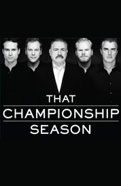Brian Cox on His Championship Co-Stars, Hollywood Hits and Oscar Host James Franco
In an acting career spanning nearly 50 years, Brian Cox has taken on everything from stage classics like King Lear to tiny independent films to blockbusters like Braveheart and The Bourne Identity. Through it all, he’s never stayed away from the stage for long. He last appeared on the Great White Way in 2007’s Rock ‘n’ Roll, in a part written for him by Tom Stoppard, and now he’s back at the Jacobs Theatre leading the starry cast of That Championship Season, Jason Miller’s Pulitzer Prize-winning play. Cox plays a former high school basketball coach whose players (Kiefer Sutherland, Chris Noth, Jason Patric and Jim Gaffigan) have reunited at his home 20 years after winning the state championship. During a break from rehearsals, Cox chatted with Broadway.com about his impressive career path, his talented co-stars and what he considers the biggest misconception about movie stars.
You've been away from Broadway stage for several years. How did That Championship Season lure you back?
[Director] Gregory Mosher got in touch with me, and when I read the play I realized what a major neglected classic it is. It’s up there with all the great American plays—Virginia Woolf, Death of a Salesman—but it’s not as well known, though it’s stood the test of time remarkably well. It’s quite edgy politically, and it’s probably the most Americana play I can think of. It deals with American issues, and American male-dom in particular. I couldn’t say no.
Well, you certainly have an impressive bunch of American males on stage with you.
I’m very proud of these guys. They’re all immensely successful, and the last thing in the world they need to do is a play like this. But it’s also the first thing they need to do. I am full of admiration for the way they’ve made the adjustment to the stage. Some of them have done plays before. Chris is probably the most experienced stage actor, and Kiefer has it in his body, because his parents are actors, so it’s in his genes and it’s certainly in Jason’s, seeing as his father wrote the play. Jim Gaffigan is incredibly rigorous, and I’m in awe of them all. They just want to act, and they work their asses off.
Coach isn’t necessarily a sympathetic character. Why did you find the role appealing?
In some ways I’m very odd casting because I am the most un-sporty person there is. I hate sports, absolutely hate them. I hate group activities of any kind; it leads to mob rule. But Coach is a very contradictory role. Someone who can say "love one another" to his boys and then say such horribly racist things as he does in the show, that’s fascinating. Lost innocence that becomes very corrupt feels incredibly American.
Your co-stars have said in interviews that having you as Coach is what made them want to the play.
It’s astonishing. I don’t think I’ve ever had such respect from people, and I don’t know what I’ve done to deserve it! I suppose I’ve got a body of work behind me now, and there is no substitute for that; if you’ve done it, you’ve done it. In some ways I can’t believe I’ve done it, and I’ve been doing it since I was 15.
Did you begin as a stage actor?
When I was young I always wanted to be a film actor because I loved American cinema, but the U.K. culture is very much about theater and I realized that’s what separated the men from the boys—you had to learn your chops in the theater. So I went to drama school and I started playing leading classical roles. I didn’t make my first American film until the early 80s, when I did Manhunter, the first Hannibal Lecter film. I played Lecter, learned a lot, then I went back to England and continued to work on my classical career. I was nearly 50 before I decided I’d really like to go into the movies.
Starting with Hannibal Lecter, you’ve played a lot of controversial characters, from Hermann Göring in Nuremberg to a pedophile in L.I.E.. What draws you to these roles?
Playing these people is about discovering their humanity, and those are the roles I love. Human beings are infinitely more complicated than we give them credit for. You don’t want audiences to sympathize with these people, but you do want them to understand who they are in a multi-dimensional way.
You’re known for working with young film directors. Why is that important to you?
They’re brilliant, and this business can be so merciless that you want to be solid for young people in a chaotic game. So much of what’s in the cinema is just crap, like this whole preoccupation with 3D. I remember 3D from the 50s. It lasted five minutes, and it was gone. It’s like seeing a juggler; once you’ve seen one juggler, the mystery is over. I have a new film coming out called Rise of the Apes with James Franco, made by Rupert Wyatt, a protégé of mine. I did his first big film called The Escapist, and now he’s given me another job! It’s sensible, really. We need interesting new voices, and they are the moguls of tomorrow.
The world just watched Franco co-host the Oscars. What was he like to work with?
He’s delightful, the iPad king. He was doing his thesis or something, and he was just constantly studying and reading books. I don’t know how much knowledge he can cram into his head, but I thought he should go ahead and get himself wired up and get it intravenously. He’s an education junkie.
Along with your indie projects, you’ve done plenty of blockbusters like the Bourne trilogy, Red and Troy.
They’re there and they pay well and they give the wolf at the door a little glass of milk. When I was young, there was a wonderfully elegant comedy writer in the UK called Frank Muir. I was this very pure, young actor and he told me, “Brian, you really must consider money. Nothing is wrong with money.” It was the best advice I was ever given.
And it's given you a chance to work with some huge film stars.
They’re all just actors. I was filming For Love of the Game with Kevin Costner, and [director] Sam Raimi kept saying, "Remember, he’s a movie star," before we began rehearsing. I said, "Sam, maybe you should just treat him like an actor." That always works.
Is that a common misconception?
Absolutely. The people I’ve worked with are usually very nice people, and they’re working from the best of motives. Brad Pitt, Matt Damon, Kevin Costner, Alec Baldwin—they all just want to do good work. There is so much other crap that is projected onto them and it’s all fictitious, it’s all hype and it’s absolutely nonsensical. Kiefer Sutherland is one of the hardest working young actors there is, as is Chris, as is Jason, and as is Jim.
Do you ever watch your blockbuster films?
Very rarely. Sometimes it catches up with me if I’ve fallen asleep watching TV and I wake up and there I am. It’s truly scary.
See Brian Cox in That Championship Season at the Jacobs Theatre.

